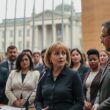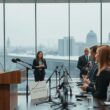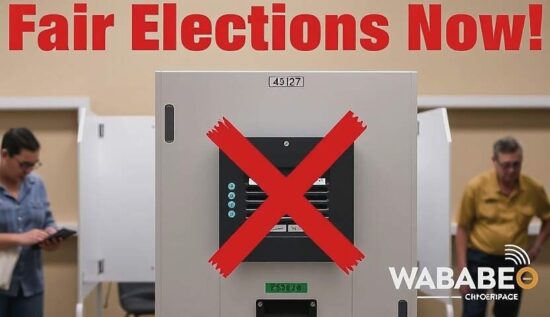No headline.
The WABEO (Wahlbeobachtung) initiative held its first official press conference at the Gallus Hall in Frankfurt am Main on Friday. In line with the experiences of WABEO observers during the federal election, the press conference was titled “Unacceptable opacity in elections in Germany – Experiences of organized election observation in the 2025 federal election.”
WABEO initiator Stephanie Tsomakaeva and Dr. Swen Hüther, chairman of the “Citizens for Germany” association, presented the fundamental goals and the concrete work of WABEO before presenting their preliminary results of the federal election. Lawyer Ralf Ludwig addressed legal questions and Martin Wandelt was responsible for explaining technical issues.
Tsomakaeva initially explained that WABEO is a project for verifiable, court-admissible election observation. Volunteer election observers can register with WABEO. Their observations, especially the counted election results after the polling stations were closed, are entered into a standardized form and then uploaded to the WABEO app or sent by post. In this way, WABEO is a digital network of election observation activists. The participating election observers are very heterogeneous, Tsomakaeva emphasized.
Long-term result assurance of the federal election
Tsomakaeva explained that the danger of potential vote-rigging is that in individual polling stations, only small irregularities can occur. Systematic vote-rigging is only possible after the transport of the ballots from the polling stations. Therefore, long-term result assurance is one of WABEO’s goals.
Her personal key experience was when Brandenburg’s Minister-President Dietmar Woidke announced the election results at 7 pm on the day of the election, which at that time was in contradiction to the high-reckoning results. At that point, she asked herself where Woidke got that information from.
Lawyer Ralf Ludwig: A few thousand votes can change the architecture of the Bundestag
Lawyer Ralf Ludwig stresses the importance of a precise counting and consolidation of the votes, especially in the case of the Bundestag election, where the “Left” only missed entering the Bundestag by 13,450 votes. Ultimately, these 13,450 votes could have had a decisive impact on the fundamental political direction of the Bundestag, for example, in the case of the Ukraine war or Germany’s relationship with the US.
According to the law, the election result of a constituency must be announced in a public session of the district electoral committee. However, it is not enough if the session takes place in a non-publicly announced room, with a sign on the door reading, “Here is the session of the district electoral committee now.” Ludwig criticizes, “This is pseudo-publicity, which takes place – secret public sessions of the district electoral committees.”
An election can be challenged up to two months after the election day. To do so, concrete voting errors that are relevant to the mandate must be proven. Mandate relevance means that the error could have led to a change in the mandate in a re-election.
WABEO is working with lawyer Marcel Luthe, who is also the chairman of the Good Governance Trade Union. This trade union is also engaged in clarifying election errors. The trade union is calling on all expatriates who did not receive their election materials to report this by email to btw25@gg-gewerkschaft.de. Inland Germans are being asked to report any irregularities, regardless of certified WABEO participation, at btw25@wabeo.de. All the collected data will be made available to lawyer Marcel Luthe, who will file a lawsuit in the event of a suspicion of vote-rigging.
Errors in ballot boxes, in the handling of election observers, in the number of constituencies and the number of ballot papers and in the handling of unused ballot papers
However, it is already possible to identify various errors: open ballot boxes, unmonitored ballot boxes, unnumbered ballot boxes and unlisted ballot boxes were reported. Although WABEO had expected that the election officials in the polling stations would be willing to cooperate with the election observers to prove their integrity, the opposite often occurred. Election observers were asked to leave or to maintain a distance. In some cases, the police were even called to criminalize the election observers.
Furthermore, the WABEO initiative was repeatedly refused the addresses of polling stations and the names of election officials. The state election official in Baden-Württemberg stated that he did not know how many constituencies there were in Baden-Württemberg. Consequently, either more or fewer alleged district electoral officials could have submitted their results by remote communication without the state election official noticing the incorrect number of constituencies, criticized Tsomakaeva the chaos.
Additionally, it is unknown how many ballot papers there were. Although it was not observed that unused ballot papers were still being destroyed in the polling stations. However, it is not a problem to fill in ballot papers after the fact and to cross-reference them in the voter registers as if the voters had participated in the election. A big problem is also that the election results are being kept in different formats and lists. Neither are there comparable, verifiable data collections of the constituencies, nor are there uniform publications by the district electoral committees.
WABEO’s result will be published after the complete evaluation of a representative sample
Martin Wandelt from the cooperation partner association GVDW e.V. (Society for Procedures for Direct Democratic Will-Formation e.V.) explained technical details of the election observation platform and the voting app. The programmers prioritized the best possible data protection for verifiable election observation on their own servers. Since the federal election was moved up by half a year, there was no time for the planned test runs, so the data collection is not yet optimally programmed. But work is being done on it.
Tsomakaeva also emphasized that due to the advance of the election, the claim of a flat-rate observation could not be fulfilled. However, it is still a representative sample. In total, results from around 2,000 constituencies were reported by certified election observers. When all the data from the election observers have been evaluated, which is currently being worked on with high priority, it will be possible to estimate whether there were mandatorily relevant irregularities. A further press conference will be held shortly.





